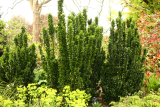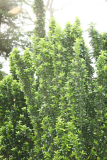Additional notes (click to expand)
Phytochemistry
Active principle: (for Euonymus europaea and related species): all parts, especially fruits: evobioside, evomonoside and other cardenolides, evonine and several alkaloids
Wink, M. (2009). Mode of Action and toxicology of plant toxins and poisonous plants. Mitt. Julius Kuhn-Inst. 421:93-111. page 9
Toxicity
Class 1b, Highly hazardous; cardiac glycosides inhibit Na+,K+-ATPase, irritation of GI tract, nausea,
hallucinations, extensive vomiting, shock, hyperthermia, bloody diarrhoea, liver and kidney disturbance, arrhythmia, strong spasms, coma after 12 h, cardiac arrest
Wink, M. (2009). Mode of Action and toxicology of plant toxins and poisonous plants. Mitt. Julius Kuhn-Inst. 421:93-111. page 99
Toxic due to content of cardio-active cardenolides.
Professor Anthony Dayan, 2022
Euonymus japonicus 'Benkomasaki'
Family: CELASTRACEAEGenus: Euonymus
Species: japonicus
Cultivar: 'Benkomasaki'
Distribution summary: Eastern Asia
Habit: Shrub
Hardiness: H5 - Hardy; cold winter
Garden status: Currently grown
Garden location: Plants of the World (C)
Flowering months: June
Reason for growing: Toxic

